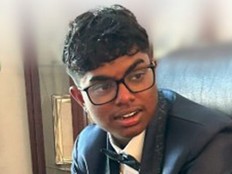Judge delays ruling on whether to scrap Trump's conviction in hush money case

Article content
NEW YORK — A judge has postponed a decision on whether to undo President-elect Donald Trump’s hush money conviction as prosecutors consider how to proceed in light of last week’s election and his lawyers argue for dismissal so he can run the country.
The postponement announced Tuesday comes at a dramatic and dynamic point in the New York case, which focused on how Trump accounted for payments to a porn actor before the 2016 election and produced a first-ever conviction of a former commander-in-chief.
Sentencing had been set for Nov. 26. But Manhattan prosecutors now say they’re reassessing, and they appear open to the possibility that the proceedings can’t go as planned.
“These are unprecedented circumstances,” Assistant District Attorney Matthew Colangelo wrote in an email to the court. He said prosecutors need to consider how to balance the “competing interests” of the jury’s verdict and the presidency.
Trump lawyer Emil Bove, meanwhile, argued the case must be thrown out altogether “to avoid unconstitutional impediments to President Trump’s ability to govern.”
The messages were exchanged over the weekend and released Tuesday, when Judge Juan M. Merchan had been set to rule on Trump lawyers’ earlier request to toss his conviction for a different reason — because of a U.S. Supreme Court ruling this summer on presidential immunity.
Instead, Merchan told Trump’s lawyers he’d halt proceedings and delay the ruling until at least Nov. 19 so that prosecutors can suggest a way forward. Both sides agreed to the one-week postponement.
Trump campaign spokesperson Steven Cheung heralded the delay. He said in a statement that the president-elect’s win makes it “abundantly clear that Americans want an immediate end to the weaponization of our justice system, including this case, which should have never been filed.”
Prosecutors declined to comment.
A jury convicted Trump in May of falsifying business records related to a $130,000 payment to porn actor Stormy Daniels in 2016. The payout was to buy her silence about claims that she had sex with Trump.
Trump says they didn’t have sex, denies any wrongdoing and maintains the prosecution was a political tactic meant to harm his latest campaign. Trump is a Republican. Manhattan District Attorney Alvin Bragg, whose office brought the case, is a Democrat, as is Merchan.
Just over a month after the verdict, the Supreme Court ruled that ex-presidents can’t be prosecuted for actions they took in the course of running the country, and prosecutors can’t cite those actions even to bolster a case centred on purely personal conduct.
Trump’s lawyers cited that ruling to argue that the hush money jury got some evidence it shouldn’t have, such as Trump’s presidential financial disclosure form and testimony from some White House aides.
Prosecutors disagreed and said the evidence in question was only “a sliver” of their case.
Trump’s criminal conviction was a first for any ex-president. It left the 78-year-old facing the possibility of a fine, probation or up to four years in prison.
The case centred on how Trump accounted for reimbursing a personal attorney for the Daniels payment.
The then-lawyer, Michael Cohen, fronted the money. He later recouped it through a series of payments that Trump’s company logged as legal expenses. Trump, by then in the White House, signed most of the checks himself.
Prosecutors said the designation was meant to cloak the true purpose of the payments and help cover up a broader effort to keep voters from hearing unflattering claims about Trump during his first campaign.
Trump said that Cohen was legitimately paid for legal services, and that Daniels’ story was suppressed to avoid embarrassing Trump’s family, not to influence the electorate.
Trump was a private citizen, campaigning for president, when Cohen paid Daniels in October 2016. He was president when Cohen was reimbursed, and Cohen testified that they discussed the repayment arrangement in the Oval Office.
Trump has been fighting for months to overturn the verdict. While urging Merchan to nix the conviction, the president-elect also has been trying to move the case to federal court. Before the election, a federal judge repeatedly said no to the move, but Trump has appealed.
Trump faces three other unrelated indictments in various jurisdictions.
But Justice Department special counsel Jack Smith has been evaluating how to wind down both the 2020 election interference case and the separate classified documents case against Trump before he takes office, a person familiar with the matter told The Associated Press. The person spoke on condition of anonymity because they were not authorized to discuss the matter publicly. Longstanding Justice Department policy says sitting presidents cannot be prosecuted.
Meanwhile, a Georgia election interference case against Trump is largely on hold while he and other defendants appeal a judge’s ruling allowing Fulton County District Attorney Fani Willis to continue prosecuting it.
— Associated Press reporter Alanna Durkin Richer in Washington contributed to this report.














Postmedia is committed to maintaining a lively but civil forum for discussion. Please keep comments relevant and respectful. Comments may take up to an hour to appear on the site. You will receive an email if there is a reply to your comment, an update to a thread you follow or if a user you follow comments. Visit our Community Guidelines for more information.